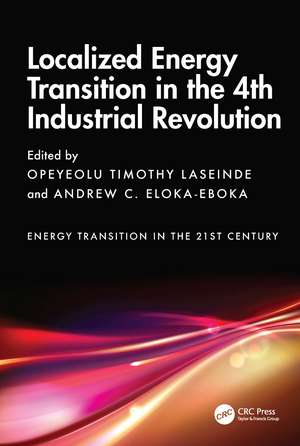Localized Energy Transition in the 4th Industrial Revolution: Energy Transition in the 21st Century
Editat de Opeyeolu Timothy Laseinde, Andrew C. Eloka-Ebokaen Limba Engleză Hardback – 24 oct 2024
Features:
- Offers useful information on new forms of renewable energy generation with reference to Industry 4.0.
- Illustrates practical approaches to energy transition.
- Provides guidance on renewable energy sources and energy storage systems.
- Discusses the application of the Fourth Industrial Revolution (4IR)-related approaches to emerging energy storage technologies.
- Includes studies that reveal approaches to realizing productivity, profitability, and increased return on investment (ROI).
Preț: 901.70 lei
Preț vechi: 1099.63 lei
-18% Nou
Puncte Express: 1353
Preț estimativ în valută:
172.54€ • 180.63$ • 142.77£
172.54€ • 180.63$ • 142.77£
Carte tipărită la comandă
Livrare economică 08-22 aprilie
Preluare comenzi: 021 569.72.76
Specificații
ISBN-13: 9781032538792
ISBN-10: 1032538791
Pagini: 320
Ilustrații: 222
Dimensiuni: 178 x 254 mm
Greutate: 0.77 kg
Ediția:1
Editura: CRC Press
Colecția CRC Press
Seria Energy Transition in the 21st Century
Locul publicării:Boca Raton, United States
ISBN-10: 1032538791
Pagini: 320
Ilustrații: 222
Dimensiuni: 178 x 254 mm
Greutate: 0.77 kg
Ediția:1
Editura: CRC Press
Colecția CRC Press
Seria Energy Transition in the 21st Century
Locul publicării:Boca Raton, United States
Public țintă
Academic and PostgraduateCuprins
Preface
Introduction
Acknowledgments
Chapter 1: The effect of specifications of solar Photovoltaic Modules on array peak power, quantity, and Weight in residential buildings
Chapter 2: A systematic approach to exploring recent improvements in the sustainability of biodiesel production
Chapter 3: In-tube condensation heat transfer correlations for horizontal smooth macro tubes
Chapter 4: A Review of numerical Tools for solar cells
Chapter 5: Performance Evaluation of a Batch–Reactor for Catalytic Depolymerization of Polymeric Waste
Chapter 6: Analysis of a Hybrid Solar Power System as a Potential Substitute in Selected Southern Nigerian Economic Activity Areas
Chapter 7: From domestic sewage Sludge to clean energy, valuable resources, zero waste and circular economy approach
Chapter 8: Nanofluid Flow through Non-Circular Cross-section for Thermohydraulic Enhancement of Energy Systems
Chapter 9: In-Situ Based Observation and Reanalysis-derived Wind Data for Offshore Wind Energy Potential Assessment in the Gulf of Guinea
Chapter 10: A Neural Network-Based Wind Turbine Power Curve Models Using Several Wind Farms’ Influencing Parameters and Topography
Chapter 11: Review of solar cells deposition techniques for the global South
Chapter 12: Smart and Sustainable Energy Systems
Chapter 13: Minimizing high free fatty acid (FFA) in rubber seed oil (RSO) using ethanol as an alcohol: Optimization by Taguchi method
Chapter 14: Energy Alternatives and Efficiency Options for Sustainable Development in Nigeria
Chapter 15: Energy improvement and storage
Chapter 16: Unveiling Africa's R&I Landscape: Mapping Capacities, Horizontal Skills, and Actions
Index
Introduction
Acknowledgments
Chapter 1: The effect of specifications of solar Photovoltaic Modules on array peak power, quantity, and Weight in residential buildings
Chapter 2: A systematic approach to exploring recent improvements in the sustainability of biodiesel production
Chapter 3: In-tube condensation heat transfer correlations for horizontal smooth macro tubes
Chapter 4: A Review of numerical Tools for solar cells
Chapter 5: Performance Evaluation of a Batch–Reactor for Catalytic Depolymerization of Polymeric Waste
Chapter 6: Analysis of a Hybrid Solar Power System as a Potential Substitute in Selected Southern Nigerian Economic Activity Areas
Chapter 7: From domestic sewage Sludge to clean energy, valuable resources, zero waste and circular economy approach
Chapter 8: Nanofluid Flow through Non-Circular Cross-section for Thermohydraulic Enhancement of Energy Systems
Chapter 9: In-Situ Based Observation and Reanalysis-derived Wind Data for Offshore Wind Energy Potential Assessment in the Gulf of Guinea
Chapter 10: A Neural Network-Based Wind Turbine Power Curve Models Using Several Wind Farms’ Influencing Parameters and Topography
Chapter 11: Review of solar cells deposition techniques for the global South
Chapter 12: Smart and Sustainable Energy Systems
Chapter 13: Minimizing high free fatty acid (FFA) in rubber seed oil (RSO) using ethanol as an alcohol: Optimization by Taguchi method
Chapter 14: Energy Alternatives and Efficiency Options for Sustainable Development in Nigeria
Chapter 15: Energy improvement and storage
Chapter 16: Unveiling Africa's R&I Landscape: Mapping Capacities, Horizontal Skills, and Actions
Index
Notă biografică
Opeyeolu Timothy Laseinde is a teaching and research Associate Professor of Mechanical and Industrial Engineering at the University of Johannesburg. He is an National Research Foundation (NRF)-rated established researcher, has authored/co-authored over 90 peer-reviewed articles, and has served as an external reviewer for notable publishers. He has vast experience interfacing with stakeholders in the industry, manufacturing sector, development agencies, and academia. As a proponent of the Sustainable Development Goals (SDGs), he has received notable awards and grants in line with innovative research involving multidisciplinary works.
Andrew C. Eloka-Eboka is an emerging dynamic researcher, chemical, and mechanical engineer with research incursion in the niche area of Food-Energy-Water-Climate Nexus, Bioenergy, Biofuels, Process Engineering, and the Environment. He has a PhD in Mechanical Engineering from the University of KwaZulu-Natal, South Africa, a Master's Degree in Mechanical Engineering specializing in Energy Studies, and a Bachelor's Degree (Hons) in Chemical Engineering/Technology. He is the Programme Manager and Associate Professor in the School of Chemical and Mineral Engineering at the North-West University, Potchefstroom, South Africa, and is leading a Research Group.
Andrew C. Eloka-Eboka is an emerging dynamic researcher, chemical, and mechanical engineer with research incursion in the niche area of Food-Energy-Water-Climate Nexus, Bioenergy, Biofuels, Process Engineering, and the Environment. He has a PhD in Mechanical Engineering from the University of KwaZulu-Natal, South Africa, a Master's Degree in Mechanical Engineering specializing in Energy Studies, and a Bachelor's Degree (Hons) in Chemical Engineering/Technology. He is the Programme Manager and Associate Professor in the School of Chemical and Mineral Engineering at the North-West University, Potchefstroom, South Africa, and is leading a Research Group.
Descriere
This book creates a holistic view about the localized energy transition while addressing current challenges associated with the production of biofuels, introducing new materials to produce solar PV panels, and digital systems for sustainable energy monitoring on a small scale, carbon capture and sequestration.
